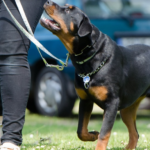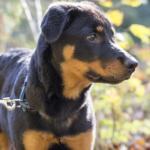Early training is the best way to make sure that your Rottweiler puppy grows up to be a well-behaved, obedient, and happy dog. But at what age should you start?
RELATED TOPICS:
- Potty Train Your Rottweiler Puppy in 5 Easy Steps
- Trained Rottweilers for Sale: How To Choose Your New Companion
- Debunking the Myth: Are Rottweilers Difficult to Train?
- Rottweiler Training: 5 Pro Tips for Success
It’s recommended to start training your Rottweiler puppy as soon as you bring them home, usually at 8 to 12 weeks old. This is because puppies at this age are highly receptive to new experiences and eager to learn. Starting early also sets a good foundation for future training and helps prevent behavior problems from developing.
Here are some basic training exercises to start with your Rottweiler puppy:
- Potty training: Potty training is the first and most important training for your Rottweiler puppy. Consistency and patience are keys to success, and you should take your puppy outside to their designated potty spot at consistent times each day.
- Socialization: Socializing your Rottweiler puppy early helps them become well-adjusted and confident with new people, animals, and environments. Expose your puppy to different sights, sounds, and experiences in a controlled and positive manner.
- Basic obedience: Teach your Rottweiler puppy basic commands such as “sit,” “stay,” “come,” and “heel.” Consistent and positive reinforcement will help your puppy learn and retain these commands.
- Crate training: Crate training is an effective tool for potty training, as well as for promoting good behavior and reducing separation anxiety. Gradually introduce your puppy to their crate and make it a comfortable and safe space for them.
Remember, training your Rottweiler puppy takes patience, consistency, and positive reinforcement. Starting early will lay the foundation for a well-behaved and obedient dog and make the training process easier for both you and your puppy.
How Do You Train A Rottweiler For Beginners?
For beginners, training a Rottweiler can seem intimidating, but it’s a gratifying experience that deepens your bond with your dog. Consistency, endurance, and encouraging feedback are essential for success. To get going, consider these suggestions:
- Start early: Rottweiler puppy training should begin as soon as the animal arrives home, typically between the ages of 8 and 12. This lays a solid foundation for subsequent training and works to prevent behavior issues from emerging.
- Use positive reinforcement. Rottweiler training is most successful when using positive reinforcement. Avoid employing punishment or physical force and instead reward positive behavior with treats, compliments, or affection.
- Put an emphasis on fundamental obedience by teaching your Rottweiler the basic commands “sit,” “stay,” “come,” and “heel.” As your puppy progresses, gradually lengthen your training sessions from the beginning.
- Socialize your dog: Rottweiler training includes a significant amount of socialization. Expose your puppy to various people, animals, and settings in a safe and encouraging way.
- If you’re having trouble teaching your Rottweiler, think about getting professional assistance. You can get individualized advice and support from a dog trainer, who can also assist you in overcoming particular training difficulties.
It’s important to keep in mind that training a Rottweiler requires time, patience, and consistency, but the reward is an entertaining, well-mannered dog. To enjoy a lifetime of companionship and happiness, begin training your Rottweiler immediately.
How Do You Discipline A Rottweiler?
Disciplining a Rottweiler requires a balanced approach that is firm, consistent, and fair. The goal of discipline is to correct unacceptable behavior and reinforce good behavior, not to harm or intimidate your dog. Here are some tips for disciplining a Rottweiler:
- Use positive reinforcement: reinforce good behavior with treats, praise, or affection. This encourages your Rottweiler to repeat the desired behavior and reinforces the bond between you and your dog.
- Avoid physical punishment: Physical punishment, such as hitting or striking your Rottweiler, is never an effective way to discipline your dog. It can cause fear, anxiety, and aggression and harm the bond between you and your dog.
- Use verbal corrections: Verbal corrections, such as a firm “no” or “stop,” can be effective in disciplining your Rottweiler. Use a stern voice and avoid yelling or shouting, which can be confusing or frightening for your dog.
- Remove rewards: If your Rottweiler is exhibiting unacceptable behavior, remove the reward or attention they are seeking. For example, if your dog is jumping on people, turn your back and ignore them until they calm down.
- Consistency is key. Consistency is key in disciplining your Rottweiler. Ensure that all family members are using the same discipline techniques and reinforcing the same rules and boundaries.
Remember, discipline should be fair and humane and should never involve physical harm or intimidation. By using positive reinforcement and consistent, firm verbal corrections, you can effectively discipline your Rottweiler and reinforce good behavior.
Do Rottweilers Prefer Inside Or Outside?
Rottweilers are a versatile breed that can adapt to both indoor and outdoor living environments. However, the preference for inside or outside largely depends on the individual dog’s personality and physical needs.
Some Rottweilers enjoy the comfort and security of being inside with their owners, while others prefer the freedom and stimulation of the great outdoors. To ensure a Rottweiler’s well-being, it’s important to provide adequate exercise, socialization, and a safe and comfortable living environment, whether inside or outside.
Final Thoughts About Start Training Your Rottweiler Puppy Early
In conclusion, starting training your Rottweiler puppy early is crucial for their development and behavior. The ideal age to begin training is around 8 to 12 weeks, when they are most receptive to learning new commands and habits.
By establishing a strong foundation of obedience and socialization at a young age, you can ensure a well-behaved, confident, and happy Rottweiler for years to come.







